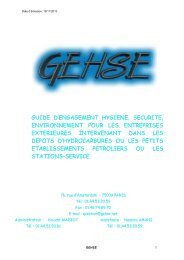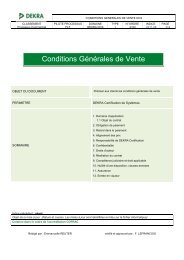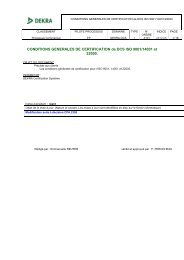3030 Auditorium 01/04 - DEKRA Certification
3030 Auditorium 01/04 - DEKRA Certification
3030 Auditorium 01/04 - DEKRA Certification
Sie wollen auch ein ePaper? Erhöhen Sie die Reichweite Ihrer Titel.
YUMPU macht aus Druck-PDFs automatisch weboptimierte ePaper, die Google liebt.
COLUMN<br />
Provocative proposals by Ulrich Grothe – Part 4. The St. Gallen-based<br />
business consultant and lecturer is convinced that companies waste valuable<br />
potential by taking a timid approach to marketing. Which is why he is urging<br />
companies to:<br />
Take marketing decisions at the top level!<br />
Getting your<br />
priorities right<br />
At times of crisis the first instinct is to<br />
reduce costs. In parallel to this, the<br />
management try to come up with an<br />
idea to catapult the company back to<br />
success. There is a flurry of visits from<br />
business consultants. Discussions are<br />
held with the strategists on reorientating<br />
the company, and with investment<br />
bankers on whether a merger or acquisition<br />
could increase market power. In<br />
the face of these important matters,<br />
brand management gets pushed onto<br />
the backburner. The marketing departments<br />
will sort something out.<br />
If we accept that the value of companies<br />
today is based to a large extent on the<br />
value of their brands, then we should<br />
start to seriously question our priorities.<br />
This applies all the more given that we<br />
are not talking exclusively about consumer<br />
goods producers here. The<br />
The author:<br />
Ulrich Grothe is a partner of MAB<br />
Consulting St. Gallen, Director of the<br />
Institute for Strategic Management<br />
at the Boston Business School and<br />
lecturer in the St. Gallen Management<br />
Programme. He advises well-known<br />
companies on corporate strategy<br />
and innovation management.<br />
Contact:<br />
grothe@mab-consulting.ch<br />
brands of IBM, General Electric and<br />
Intel are valued at between 30 and 50<br />
billion US dollars, putting them among<br />
the ten most valuable brands in the world.<br />
What makes<br />
the brand value?<br />
Companies with powerful brands can<br />
push through higher prices, enjoy greater<br />
customer loyalty, attract the most capable<br />
employees and have significantly<br />
lower costs when launching new products.<br />
It is scarcely surprising, then, that<br />
they are so popular with the stock exchanges.<br />
Their high value also gives them<br />
protection from hostile takeovers. At the<br />
same time they find it easy to obtain<br />
shares in other companies through share<br />
swaps.<br />
I know what you’re about to say: “That<br />
may be true for the majors, but things<br />
are different for small companies like us.”<br />
In response I would cite the experience<br />
of Kärcher, Jungheinrich, Würth, Hilti,<br />
Stihl and many others. Companies with<br />
great products which started from humble<br />
beginnings and whose rapid growth<br />
was basically down to their excellent<br />
brand management.<br />
Brand building<br />
pays dividends<br />
We respect brands. But how do you<br />
create such valuable respect? Goretex,<br />
Bose,Bosch, Shimano, Recaro and<br />
many others have followed the example<br />
set by Intel and market their products<br />
to their clients’ customers. The actual<br />
buyers pay more for these premium<br />
products but can then charge higher<br />
prices in turn. Here we are talking<br />
about so-called ingredient marketing.<br />
A lot can be achieved for a small amount<br />
of money. Opposition leader Angela<br />
Merkel with a windswept hairdo – everyone<br />
in Germany had a good laugh and<br />
ended up talking about it. The media<br />
impact of this campaign was enormous<br />
in comparison to its cost. Schwaben<br />
Bräu served 1.125 litre mugs of beer at<br />
the Stuttgart Volksfest. The customers<br />
paid the normal price for a litre but were<br />
given an eighth of a litre extra, free, by<br />
Schwaben Bräu. This was talked about<br />
way beyond the city borders of Stuttgart,<br />
particularly after the rivals (unsuccessfully)<br />
tried to press charges against the<br />
brewery. Tupperware has never paid<br />
any money for advertising, yet a Tupperware<br />
party is started somewhere in<br />
the world every 2.7 seconds.<br />
What is the key factor?<br />
In nearly all the examples listed above,<br />
the companies concerned kept a tight<br />
hold of the reins when it came to building<br />
the brand. Bold campaigns such as<br />
those launched by Sixt, Schwaben Bräu<br />
or even Puma require true entrepreneurial<br />
decision-making. It is seldom that<br />
managers in marketing departments<br />
are daring enough to think so unconventionally.<br />
Which is why this is one<br />
area you should not delegate – but take<br />
the decisions yourself at the top level!

















